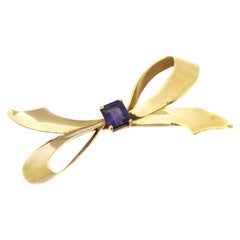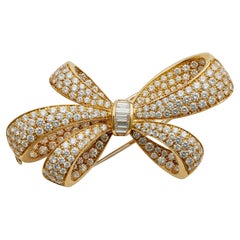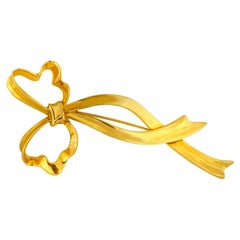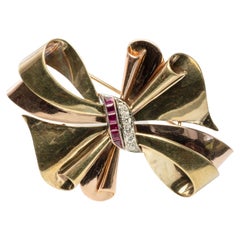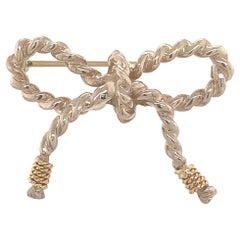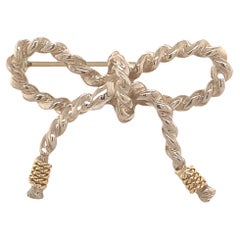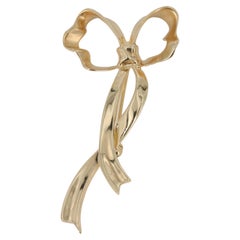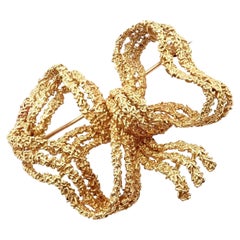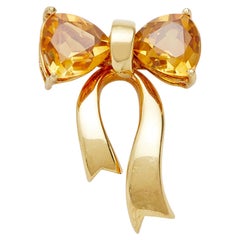Tiffany Gold Bow Brooch
Vintage 1940s American Retro Brooches
Amethyst, 14k Gold, Yellow Gold
Late 20th Century American Brooches
Diamond, Gold, 18k Gold, Yellow Gold
Late 20th Century American Contemporary Brooches
Gold, 18k Gold, Yellow Gold
Mid-20th Century Brooches
Diamond, Ruby, 14k Gold, Rose Gold, Yellow Gold
1990s American Brooches
18k Gold, Sterling Silver
1990s American Brooches
18k Gold, Sterling Silver
21st Century and Contemporary American Modern Brooches
Yellow Gold
Vintage 1980s American Brooches
Yellow Gold
20th Century Unknown Modern Brooches
Citrine, Gold, 18k Gold, Yellow Gold
20th Century Contemporary Brooches
14k Gold, Yellow Gold
21st Century and Contemporary American Brooches
20th Century Brooches
Sapphire, Yellow Gold, 18k Gold
20th Century German Contemporary Brooches
Diamond, Gold, 14k Gold, Yellow Gold
20th Century Unknown Retro Brooches
Gold, 14k Gold, Sterling Silver
21st Century and Contemporary Retro Brooches
Diamond, Ruby, 14k Gold, Rose Gold, White Gold
Late 20th Century Italian Contemporary Brooches
18k Gold, Yellow Gold
1990s American Brooches
14k Gold, Sterling Silver
Vintage 1940s American Brooches
14k Gold
21st Century and Contemporary Unknown Brooches
Diamond, 18k Gold, Yellow Gold, Platinum
Vintage 1980s American Brooches
Diamond, White Diamond, 18k Gold, Yellow Gold, Platinum
Vintage 1910s American Edwardian Brooches
Diamond, 18k Gold, Platinum
20th Century Brooches
Gold, 14k Gold, 18k Gold, White Gold, Yellow Gold, Enamel
20th Century Brooches
Citrine, Gold, 14k Gold, Rose Gold
21st Century and Contemporary Brooches
Ruby, Gold, 14k Gold, Rose Gold
Vintage 1950s Retro Brooches
Amethyst, Diamond, Gold, 14k Gold, Yellow Gold, Palladium
Vintage 1980s American Brooches
Diamond, White Diamond, 18k Gold, Yellow Gold, Platinum
Vintage 1940s American Retro Brooches
Aquamarine, Diamond, Ruby, 14k Gold
20th Century American Contemporary Brooches
18k Gold, Yellow Gold
Mid-20th Century Italian Brooches
18k Gold, Yellow Gold
American Brooches
Vintage 1970s Modern Brooches
18k Gold
1990s American Brooches
18k Gold, Yellow Gold
Antique Late 19th Century American Art Nouveau Brooches
Diamond, Platinum, 14k Gold
Mid-20th Century Brooches
18k Gold, Yellow Gold, Enamel
20th Century Retro Brooches
Aquamarine, Gold, 14k Gold, Rose Gold, Yellow Gold
Vintage 1960s Unknown Brooches
18k Gold
Vintage 1970s Italian Brooches
18k Gold, Yellow Gold, Enamel
Vintage 1940s American Brooches
Citrine, 14k Gold
Late 20th Century American Retro Brooches
18k Gold
1990s Brooches
Gold, 18k Gold, Yellow Gold, Sterling Silver
20th Century American Brooches
Diamond, Ruby, 14k Gold
Vintage 1940s Retro Brooches
Aquamarine, Ruby, Rose Gold
Vintage 1980s American Contemporary Brooches
Gold, 18k Gold, Yellow Gold
Vintage 1960s Italian Contemporary Brooches
Gold, 18k Gold, Yellow Gold
Vintage 1930s American Art Deco Brooches
Diamond, Gold, Platinum
Vintage 1960s Contemporary Brooches
White Diamond, Diamond, Gold, 18k Gold, Yellow Gold, Platinum
Vintage 1920s American Art Deco Brooches
Diamond, Platinum
1990s Brooches
Gold, Enamel
20th Century Brooches
Sapphire, Mixed Metal
Vintage 1980s American Contemporary Brooches
18k Gold, Yellow Gold
Vintage 1940s Retro Brooches
Ruby, White Diamond, 14k Gold
20th Century Unknown Brooches
Gold, 18k Gold, Yellow Gold
1990s American Brooches
18k Gold, Sterling Silver
Vintage 1960s Brooches
Diamond, Blue Sapphire, 18k Gold, Yellow Gold
Mid-20th Century Retro Brooches
14k Gold, Yellow Gold
Vintage 1980s Contemporary Brooches
Gold, 18k Gold, Yellow Gold
1990s American Brooches
18k Gold, Yellow Gold, Sterling Silver
1990s American Brooches
18k Gold, Yellow Gold, Sterling Silver
1990s American Brooches
18k Gold, Sterling Silver
1990s American Brooches
18k Gold, Sterling Silver
- 1
Tiffany Gold Bow Brooch For Sale on 1stDibs
How Much is a Tiffany Gold Bow Brooch?
Tiffany & Co. for sale on 1stDibs
Tiffany & Co. is one of the most prominent purveyors of luxury goods in the United States, and has long been an important arbiter of style in the design of diamond engagement rings. A young Franklin Delano Roosevelt proposed to his future wife, Eleanor, with a Tiffany ring in 1904. Vanderbilts, Whitneys, Astors and members of the Russian imperial family all wore Tiffany & Co. jewelry. And Jacqueline Kennedy Onassis preferred Tiffany china for state dinners at the White House.
Although synonymous with luxury today, the firm started out rather modestly. Charles Lewis Tiffany and John B. Young founded it in Connecticut as a “stationery and fancy goods emporium” in 1837, at a time when European imports still dominated the nascent American luxury market. In 1853, Charles Tiffany — who in 1845 had launched the company’s famed catalog, the Blue Book, and with it, the firm’s signature robin’s-egg blue, which he chose for the cover — shifted the focus to fine jewelry.
In 1868, Tiffany & Co. gained international recognition when it became the first U.S. firm to win an award for excellence in silverware at the Exposition Universelle in Paris. From then on, it belonged to the pantheon of American luxury brands.
At the start of the Gilded Age, in 1870, Tiffany & Co. opened its flagship store, described as a "palace of jewels" by the New York Times, at 15 Union Square West in Manhattan. Throughout this period, its designs for silver tableware, ceremonial silver, flatware and jewelry were highly sought-after indicators of status and taste. They also won the firm numerous accolades, including the grand prize for silverware at the Paris Exposition of 1878. Among the firm’s glittering creations from this time are masterworks of Art Nouveau jewelry, such as this delicate aquamarine necklace and this lavish plique-à-jour peridot and gold necklace, both circa 1900.
When Charles Lewis Tiffany died, in 1902, his son Louis Comfort Tiffany became the firm’s design director. Under his leadership, the Tiffany silver studio was a de facto design school for apprentice silversmiths, who worked alongside head artisan Edward C. Moore. The firm produced distinctive objects inspired by Japanese art and design, North American plants and flowers, and Native American patterns and crafts, adding aesthetic diversity to Tiffany & Co.’s distinguished repertoire.
Tiffany is also closely associated with diamonds, even lending its name to one particularly rare and exceptional yellow stone. The firm bought the Tiffany diamond in its raw state from the Kimberley mines of South Africa in 1878. Cut to create a 128.54-carat gem with an unprecedented 82 facets, it is one of the most spectacular examples of a yellow diamond in the world.
In a broader sense, Tiffany & Co. helped put diamonds on the map in 1886 by introducing the American marketplace to the solitaire diamond design, which is still among the most popular engagement-ring styles. The trademark Tiffany® Setting raises the stone above the band on six prongs, allowing its facets to catch the light. A lovely recent example is this circa-2000 platinum engagement ring. Displaying a different design and aesthetic (but equally chic) is this exquisite diamond and ruby ring from the 1930s.
Find Tiffany & Co. jewelry, serveware and decorative objects for sale on 1stDibs.
Why Gold Shines in Jewelry Craftsmanship
Gold is the feel-good metal, the serotonin of jewelry. Wear vintage and antique gold necklaces, watches, gold bracelets or gold rings and you feel happy, you feel dressed, you feel, well, yourself.
Gold, especially yellow gold, with its rich patina and ancient pedigree going back thousands of years, is the steady standby, the well-mannered metal of choice. Any discussion of this lustrous metal comes down to a basic truth: Gold is elementary, my dear. Gold jewelry that couples the mystique of the metal with superb design and craftsmanship achieves the status of an enduring classic. Many luxury houses have given us some of our most treasured and lasting examples of gold jewelry over the years.
Since its founding, in 1837, Tiffany & Co. has built its reputation on its company jewelry as well as its coterie of boutique designers, which has included Jean Schlumberger, Donald Claflin, Angela Cummings and Elsa Peretti. There are numerous gold Tiffany classics worth citing. Some are accented with gemstones, but all stand out for their design and the workmanship displayed.
For the woman who prefers a minimalist look, the Tiffany & Co. twist bangle (thin, slightly ovoid) is stylishly simple. For Cummings devotees, signature pieces feature hard stone inlay, such as her pairs of gold ear clips inlaid with black jade (a play on the classic Chanel black and tan), or bangles whose design recalls ocean waves, with undulating lines of lapis lazuli and mother-of-pearl. And just about any design by the great Jean Schlumberger is by definition a classic.
Even had he eschewed stones and diamonds, Southern-born David Webb would be hailed for the vast arsenal of heavy gold jewelry he designed. Gold, usually hammered or textured in some manner, defines great David Webb jewelry. The self-taught jeweler made very au courant pieces while drawing inspiration from ancient and out-of-the-way sources — East meets West in the commanding gold necklaces made by Webb in the early 1970s. The same could be said for his endlessly varied gold cuffs.
In Europe, many houses have given us gold jewelry that sets the highest standard for excellence, pieces that were highly sought after when they were made and continue to be so.
Numerous designs from Cartier are homages to gold. There are the classic Trinity rings, necklaces and bracelets — trifectas of yellow, white and rose gold. As a testament to the power of love, consider the endurance of the Cartier Love bracelet.
Aldo Cipullo, Cartier’s top in-house designer from the late 1960s into the early ’70s, made history in 1969 with the Love bracelet. Cipullo frequently said that the Love bracelet was born of a sleepless night contemplating a love affair gone wrong and his realization that “the only remnants he possessed of the romance were memories.” He distilled the urge to keep a loved one close into a slim 18-karat gold bangle.
BVLGARI and its coin jewelry, gemme nummarie, hit the jackpot when the line launched in the 1960s. The line has been perennially popular. BVLGARI coin jewelry features ancient Greek and Roman coins embedded in striking gold mounts, usually hung on thick link necklaces of varying lengths. In the 1970s, BVLGARI introduced the Tubogas line, most often made in yellow gold. The Tubogas watches are classics, and then there is the Serpenti, the house's outstanding snake-themed watches and bracelets.
A collection called Monete that incorporated the gold coins is one of several iconic BVLGARI lines that debuted in the 1970s and ’80s, catering to a new generation of empowered women. Just as designers like Halston and Yves Saint Laurent were popularizing fuss-free ready-to-wear fashion for women on the go, BVLGARI offered jewels to be lived in.
Since Van Cleef & Arpels opened its Place Vendôme doors in 1906, collection after collection of jewelry classics have enchanted the public. As predominantly expressed in a honeycomb of gold, there is the Ludo watch and accessories, circa the 1920s, and the golden Zip necklace, 1951, whose ingenious transformation of the traditional zipper was originally proposed by the Duchess of Windsor. Van Cleef's Alhambra, with its Moroccan motif, was introduced in 1968 and from the start its popularity pivoted on royalty and celebrity status. It remains one of VCA’s most popular and collected styles.
Mention must be made of Buccellati, whose name is synonymous with gold so finely spun that it suggests tapestry. The house’s many gold bracelets, typically embellished with a few or many diamonds, signified taste and distinction and are always in favor on the secondary market. Other important mid-20th-century houses known for their gold-themed jewelry include Hermès and Ilias Lalaounis.
Find a stunning collection of vintage and antique gold jewelry on 1stDibs.
Finding the Right Brooches for You
Vintage brooches, which refer to decorative jewelry traditionally pinned to garments and used to fasten pieces of clothing together where needed, have seen increasing popularity in recent years.
While jewelry trends come and go, brooches are indeed back on the radar thanks to fashion houses like Gucci, Versace, Dior and Saint Laurent, all of which feature fun pinnable designs in their current collections. Whether a dazzlingly naturalistic Art Nouveau dragonfly, a whimsical David Webb animal, a gem-studded bloom or a streamlined abstract design, these jewels add color and sparkle to your look and a spring to your step.
Given their long history, brooches have expectedly taken on a variety of different shapes and forms over time, with jewelers turning to assorted methods of ornamentation for these accessories, including enameling and the integration of pearls and gemstones. Cameo brooches that originated during the Victorian age are characterized by a shell carved in raised relief that feature portraits of a woman’s profile, while 19th-century micromosaic brooches, comprising innumerable individually placed glass fragments, sometimes feature miniature depictions of a pastoral scene in daily Roman life.
At one time, brooches were symbols of wealth, made primarily from the finest metals and showcasing exquisite precious gemstones. Today, these jewels are inclusive and universal, and you don’t have to travel very far to find an admirer of brooches. They can be richly geometric in form, such as the ornate diamond pins dating from the Art Deco era, or designer-specific, such as the celebrated naturalistic works created by Tiffany & Co., the milk glass and gold confections crafted by Trifari or handmade vintage Chanel brooches of silk or laminated sheer fabric. Chanel, of course, has never abandoned this style, producing gorgeously baroque CC examples since the 1980s.
Brooches are versatile and adaptable. These decorative accessories can be worn in your hair, on hats, scarves and on the lower point of V-neck clothing. Pin a dazzling brooch to the lapel of your blazer-and-tee combo or add a cluster of smaller pins to your overcoat. And while brooches have their place in “mourning jewelry,” in that a mourning brooch is representative of your connection to a lost loved one, they’re widely seen as romantic and symbolic of love, so much so that a hardcore brooch enthusiast might advocate for brooches to be worn over the heart.
Today, find a wide variety of antique and vintage brooches for sale on 1stDibs, including gold brooches, sapphire brooches and more.
- 1stDibs ExpertAugust 17, 2021A Tiffany & Co. engagement ring can cost as little as $13,000 or as much as $500,000 depending on the center stone’s carat weight, the band material and whether or not there are any side stones. The smaller the stone, the cheaper the ring will be. Find engagement rings designed by Tiffany & Co. on 1stDibs.
